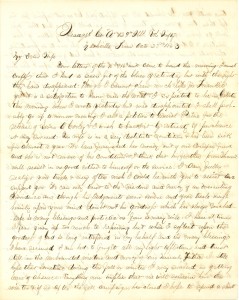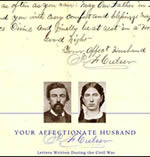 [google-map-v3 width=”400″ height=”300″ zoom=”12″ maptype=”hybrid” mapalign=”right” directionhint=”false” language=”default” poweredby=”false” maptypecontrol=”false” pancontrol=”false” zoomcontrol=”true” scalecontrol=”falso” streetviewcontrol=”false” scrollwheelcontrol=”false” addmarkermashupbubble=”false” addmarkerlist=”36.167783; -86.778365{}1-default.png” bubbleautopan=”true” showbike=”false” showtraffic=”false” showpanoramio=”false”]
[google-map-v3 width=”400″ height=”300″ zoom=”12″ maptype=”hybrid” mapalign=”right” directionhint=”false” language=”default” poweredby=”false” maptypecontrol=”false” pancontrol=”false” zoomcontrol=”true” scalecontrol=”falso” streetviewcontrol=”false” scrollwheelcontrol=”false” addmarkermashupbubble=”false” addmarkerlist=”36.167783; -86.778365{}1-default.png” bubbleautopan=”true” showbike=”false” showtraffic=”false” showpanoramio=”false”]
Headqrs. Co. “A” 129th Ills. Vol. Infty.
Nashville, Tenn., Octr. 23rd 1863
My Dear Wife
Your letters of the 15th & 16th inst. came to hand this morning.1 I must confess that I had a severe fit of the blues yesterday, but with the night they have disappeared. Though I cannot glean much hope for Frankie, yet it is a satisfaction to know even the worst.
I expected to be in Gallatin this morning, when I wrote yesterday, but was disappointed.2 I shall probably go up to-morrow evening. I sent a petition to General Paine for the release of Lorin O. Cooley, & I wish to back it by entreaty if perchance it may succeed.3 His wife is in a very destitute condition & has been sick for almost a year. We have furnished her money out of our Company fund, and she is not aware of his condition; & I think that his further punishment will result in no good either to himself or the service.
I can fully realize your trials, & very often wish I could be with you to assist and support you. We can only trust to the wisdom and mercy of an overruling Providence, and though his judgments seem severe, and your trials weigh heavily upon your mind, doubt not his goodness, which has always vouchedsafe so many blessings and protected us from so many evils. I have at times, I fear, given up too much to repining, but when I reflect upon the goodness of God so long interposed in my behalf and the many blessings I have received, I am led to forget all my light afflictions and trust still in the unbounded wisdom and mercy of our Heavenly Father.
I still hope that sometime during this fall or winter I may succeed in getting leave of absence. Everything now implies that we will remain here this winter, &, if so after the fall campaign has closed, I hope to spend a short time with you. Yet should all my efforts fail, let us not repine for in less than two years my time of service will expire, and then we will go home again.
I informed Mother [Murphy], in one of my letters, of her mistake, & I doubt not she will be surprised, as she wrote so positively that she knew what was the matter. I have had quite a laugh at her expense & would enjoy an opportunity to tease her about her long experience in such matters very much.4
I recd. your letter to Bro. Johnie after I wrote to you. By some misfortune it had got into some of the other companies; I sent it forward immediately. You will find his address in full in his letter which I sent you a few days ago. You told him I sent you all important letters, but I have sent you every letter I received but one, & I mislaid that one some way & could not find it. I took the liberty to add a post-script to your letter.
You wish to know if the contention in Pontiac is only political. It was at first but has grown into personal hatred and enmity.5 The people do not associate as formerly, and the sources of quarrel[ing] and wrangling are interminable. It shows a disposition of base cowardice or else unpardonable duplicity. They are either afraid to stand out boldly for the right or else pecuniary interests are allowed to embarrass them. Either is a despicable excuse, and the kind of spirit manifested will surely result in a total degeneration of the moral tone of society there. May God open their eyes and enlighten their minds to the dangers that lie before them.
I really fear that I did not sufficiently weigh the matter of your visit to Carlisle. It never occurred to my mind that you would ever meet with anything that could impress you unfavorably. But, My Dear Wife, let me assure you from a full knowledge of the persons, and all that could be brought into comparison, you have nothing to fear. Will Mullin I know well, far better than sister Lizzie [Zug] can. His wife, formerly Fanny Porter, was the most intimate friend of Mary P[ostlethwaite] & doubtless is fully acquainted with all that ever transpired, while Will’s Bro., Jos. Mullin, was my room-mate for over a year, &, though not a confidante of mine, was doubtless well posted. I was often in company with all the Boys & knew their estimate of Mary Pfostlethwaite] which was never very flattering.
Even Will Mullin’s wife, warmly as she was attached to her, attempted to convince me very many times that I was deceived.6 Thus I feel assured that you have nothing to fear while you may justly feel proud of conscious superiority. I am not surprised that he [she] [Mary P.] should feel anxious to make your acquaintance for many reasons of which I do not deem myself justified in speaking. I might have told you, but the persons were all unknown to you, & I feared I should not be able to explain sufficiently to make it interesting. I hope to have an opportunity some time, however, & a knowledge of the persons will aid materially. It was all, however, only those little things in which boys & girls so often engage. Each trying to outdo the other in their attentions to the greatest number, or to have exclusive rights over the other. I had almost forgotten them in the cares of the past few years & the enjoyment of present happiness. I will be able to tell you in a few weeks.
Should you meet with Fanny Mullin, Will’s wife, you will find her not only agreeable but of a very sweet disposition and one of the finest singers in the East. She was very beautiful as a girl of 16 & 18, but when I last saw her she had faded considerably. Remember me kindly to her & also her husband if you meet them.
Miss Laura Keene of New York is in the city & playing at the New Theatre.7 I went to hear her night before last in the “Blind Heiress” or “Eleanor Mowbry.” She has lost none of her old style & power. I heard her in the same play several years ago. I do not know that I ever felt the same power in her rendition of the play as on that night, and it brought to mind so many incidents of my own eventful life that I believe it proved very profitable.
It has been raining very hard all morning and is quite gloomy out of doors, yet I have felt happy. My health is good for which I have great reason to be thankful.
I have not been able to write as often of late from some cause, we have been almost constantly on duty. The war news are very cheering. Burnside’s demonstration in the rear of Lee’s Army is drawing off troops from our front, & our Army is preparing to move.8 We hope soon to hear of glorious victories.
Abbie Remick has never furnished the [promised] pictures yet. I shall remind both her & Lida of their promised New Year’s present if I don’t forget it. I have received no letters & have not written to either Sister Lizzie or Bro. Wes. yet.
Give my love to all the family & Remember me kindly to all our friends. Kiss Frankie for me. I accept the kiss sent. How much I wish I could be with him to assist in caring for him. Do not let his illness prey upon your own health. Long confinement to a sick Room will seriously effect your health without great care and abundant exercise in the open air. If you can only be contented and happy, I shall not regret your long visit at Father’s.
How is Mother’s health, & Why does not Sister Hannah write? She has not written one word since you went there. I must write to her & find out why it is.
And now, my Dear Wife, do not let our sore trials weigh so heavily upon your mind. God intends this chastening for our good. Let us not doubt his goodness or mercy but trusting implicitly in his wisdom resign all to his Will. Let my love for you console you in all that worldly things afford, and for all else let us trust to Jesus. May He bless & Keep you, preserve us for the enjoyment of each other’s society in life, and finally give us Sweet rest in Heaven.
Your Affect. Husband
J.F. Culver
- Mary Culver’s letters of October 15 and 16 are missing from the Culver Collection. [↩]
- J.F.C.’s letter of October 22 is missing from the Culver Collection. [↩]
- Lorin O. Cooley, a 25-year-old farmer, was mustered into service on Sept. 8, 1862, as a private in Company A, 129th Illinois. Private Cooley was placed under arrest for getting “beastly drunk” and deserting his post to watch a cock fight, and was confined to the guardhouse at Gallatin, Tenn., June 29, 1863. Court martialed, he was sentenced on July 20 to stoppage of pay and to be confined at hard labor for six months in the Nashville penitentiary. His sentence was commuted Oct. 23, 1863, by order of General Paine, and he rejoined his unit. Private Cooley was mustered out near Washington, D.C., June 8, 1865. Compiled Service Records of Union Soldiers, NA. [↩]
- Mrs. Murphy had mistakenly suspected that her daughter was pregnant, and J.F.C.’s comment about “her long experience” refers to her having given birth to three sons and two daughters. [↩]
- With an election at hand, the Livingston County Republicans and Democrats were at each others’ throats. The question of the administration’s conduct of the war and emancipation of the blacks had inflamed passions. [↩]
- Although Mary Culver’s letter in which she broached that subject is missing, it is apparent that J.F.C. courted Mary Postlethwaite while a student at Dickinson College. [↩]
- Laura Keene, a British actress trained in Mme. Vestris’ Company, came to the United States in 1852 as a member of James W. Wallack’s New York Company. She enjoyed brilliant success as a comedy star. She starred in “Our American Cousin” at Ford’s Theater on the night President Lincoln was assassinated. Miss Keene was appearing at the New Theatre, at the corner of Union and Summer Streets. [↩]
- The report that General Bragg had detached troops from his army investing Chattanooga to send against Burnside’s command at Knoxville was premature. Twelve days later, on November 4, Bragg sent General Longstreet with two divisions to operate against Burnside in East Tennessee. This was a blunder on the Confederates’ part which Grant exploited. Long, Civil War, Day by Day, p. 430. [↩]

 Subscribe via RSS
Subscribe via RSS Subscribe via Email
Subscribe via Email